©Copyright Shenzhen Hehejin Industrial Co., LTD. All rights reserved. Site Map
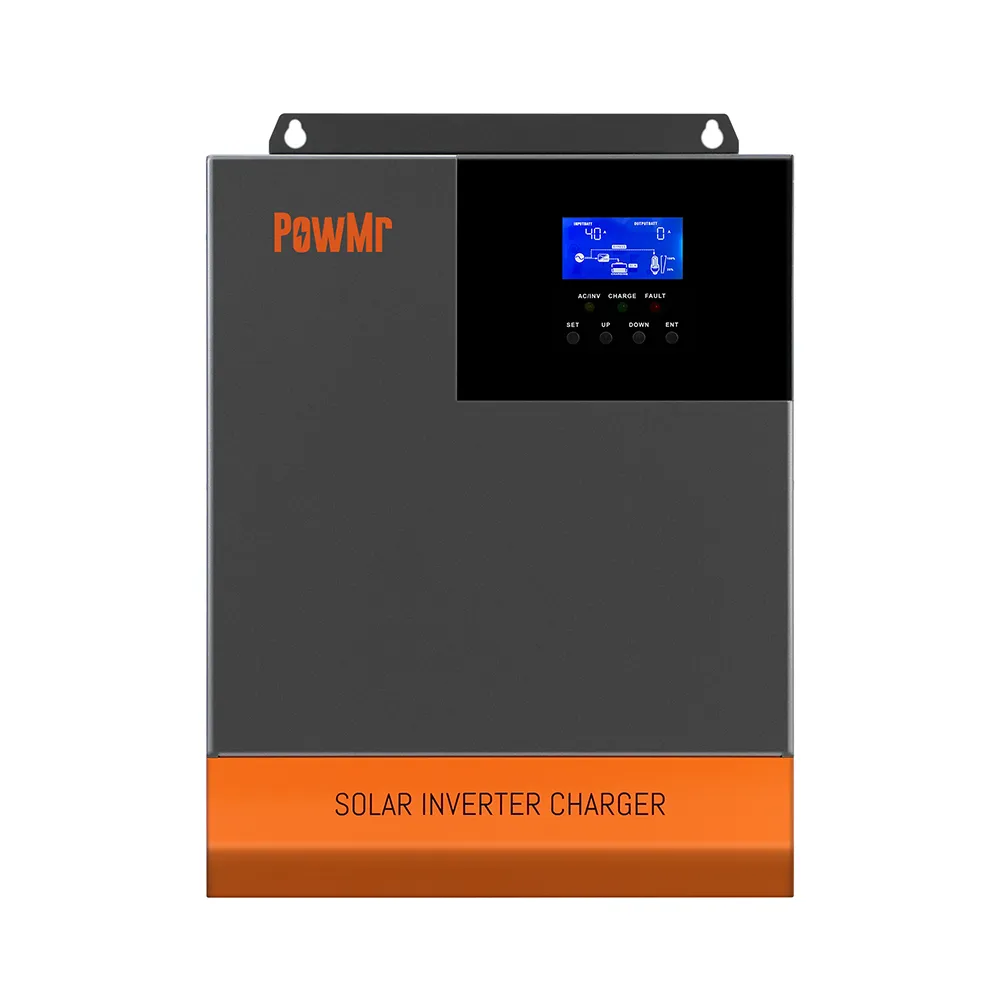
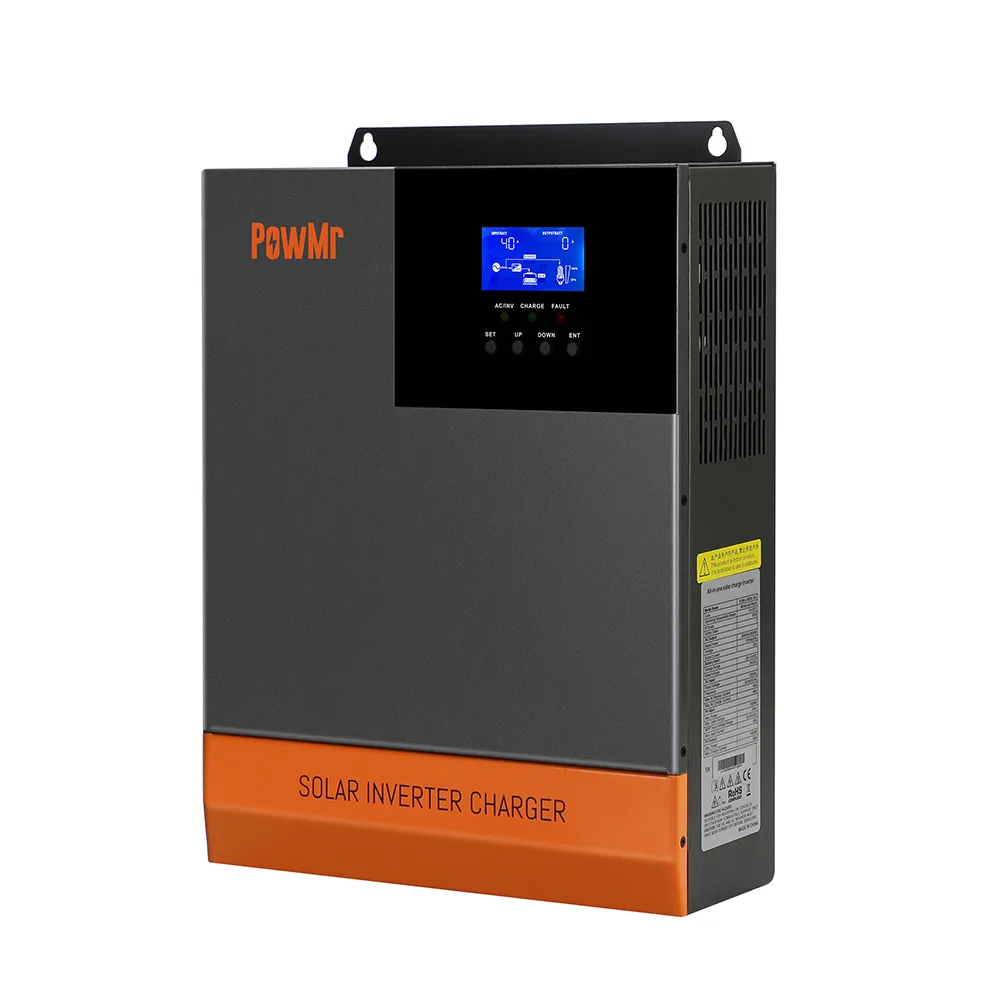
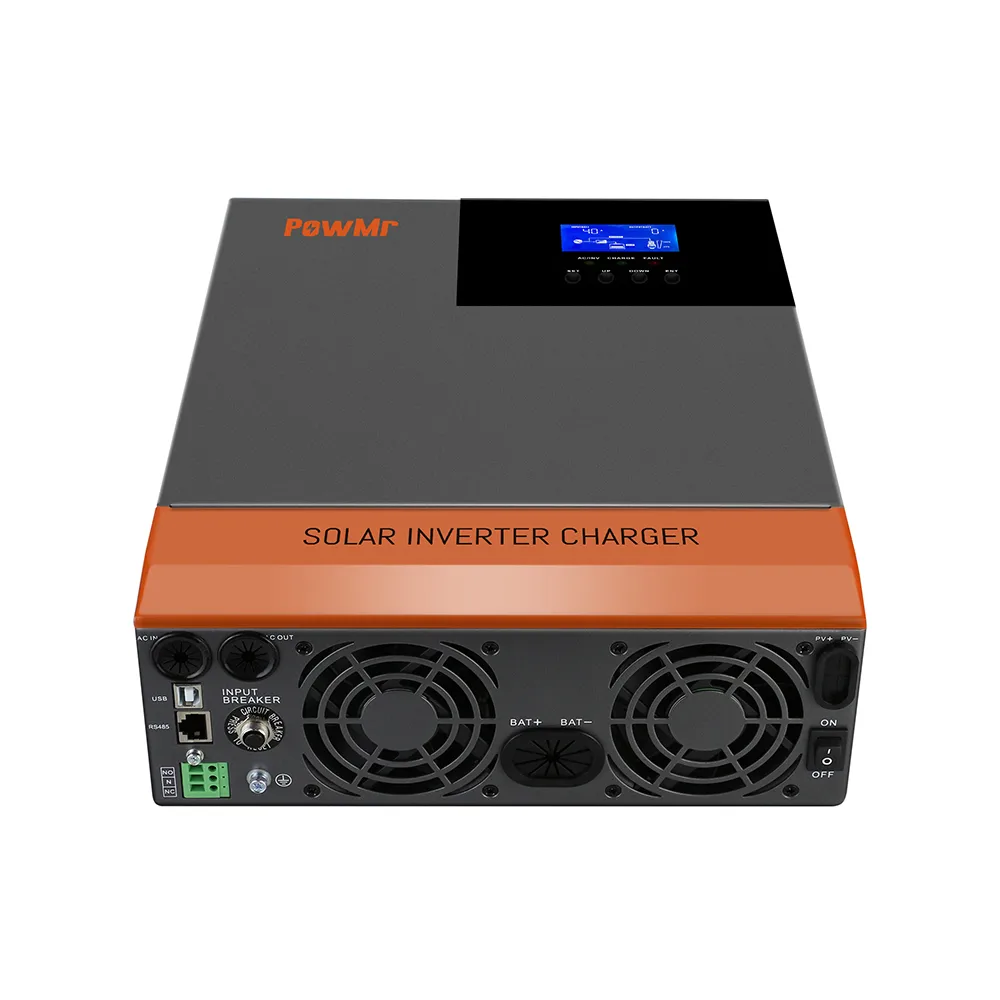
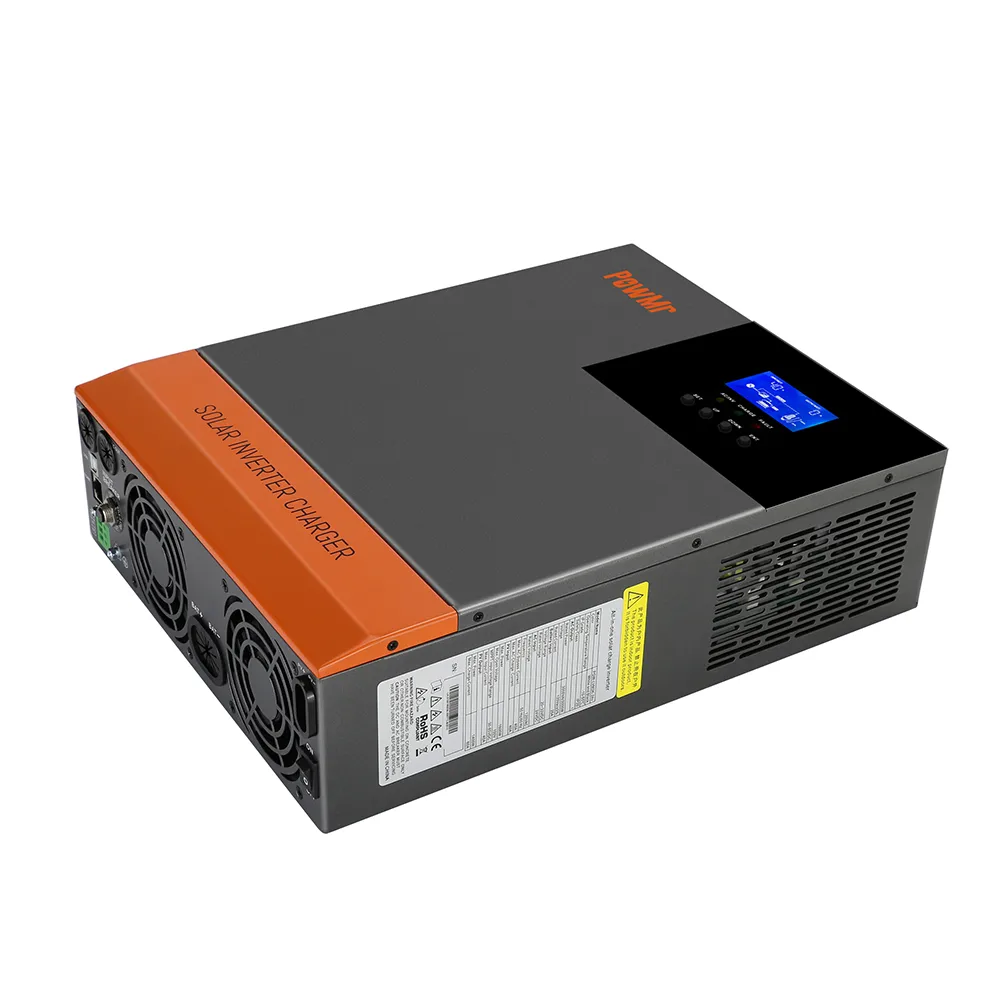
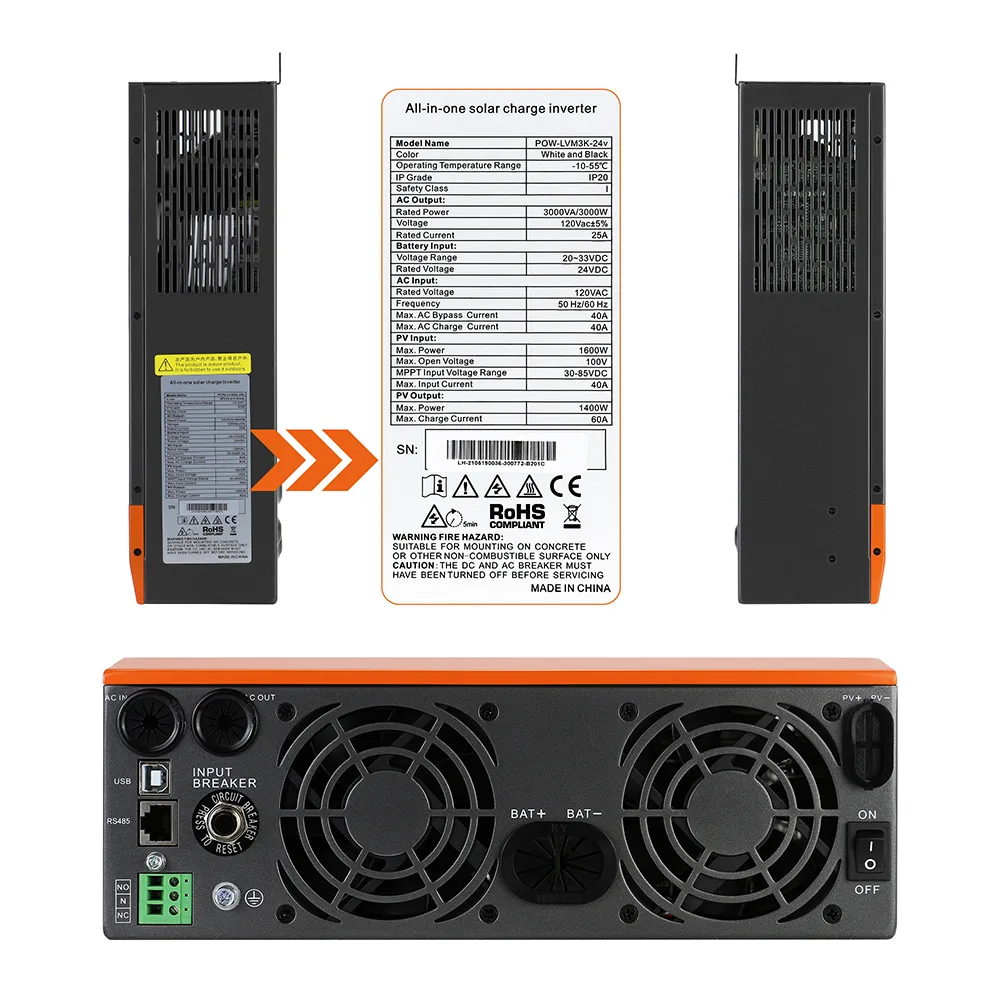
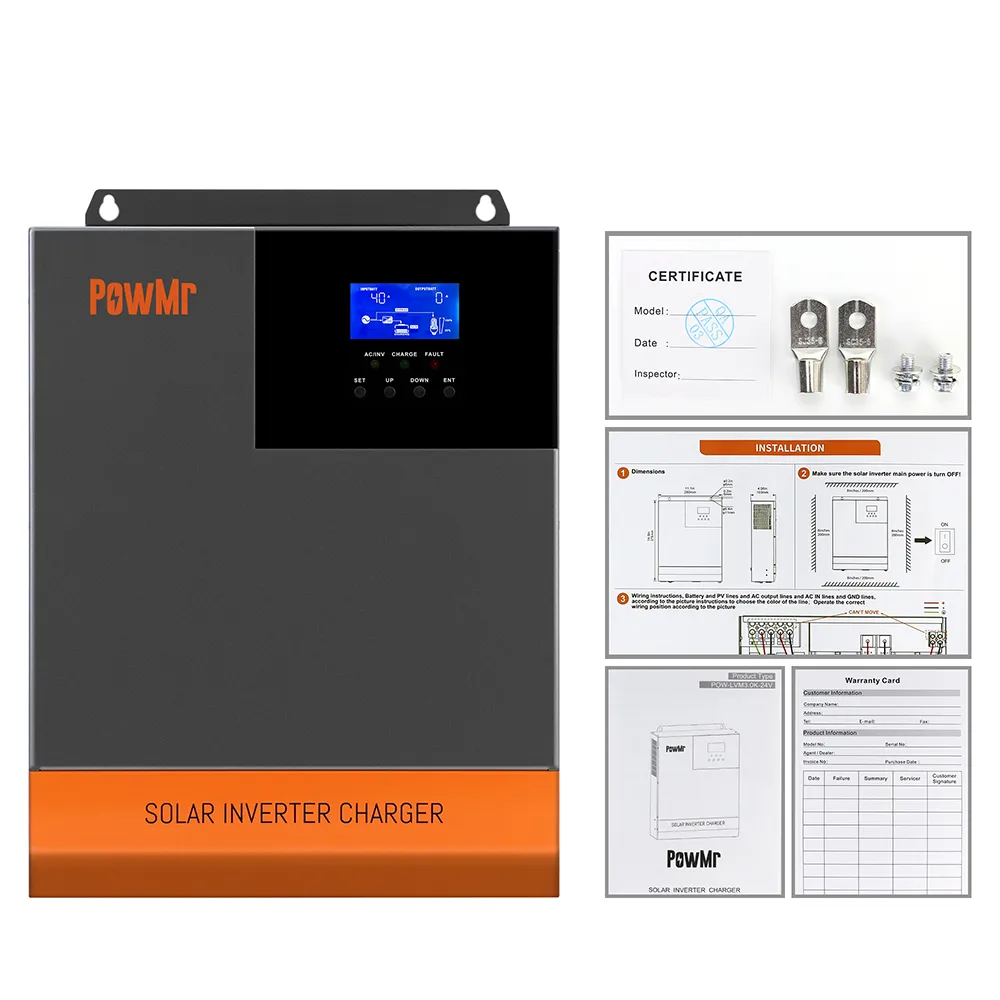

|
Output Voltage:
|
|

Pow series is a new hybrid solar charge inverter, which integrates solar energy storage &means charging energy storage and AC sine wave output. Thanks to DSP control and advanced control algorithm, it has high response speed, high reliability, and high industrial standard. Four charging modes are optional, i.e. Only Solar, Mains Priority, Solar Priority, and Mains & Solar hybrid charging; and two output modes are available, i.e. Inverter and Mains, to meet different application requirements. The solar charging module applies the latest optimized MPPT technology to quickly track the maximum power point of the PV array in any environment and obtain the maximum energy of the solar panel in real-time. Through a state-of-the-art control algorithm, the AC-DC charging module realizes fully digital voltage and current double closed-loop control, with high control precision in a small volume. Wide AC voltage input range and complete input/output protections are designed for stable
and reliable battery charging and protection. Based on full-digital intelligent design, the DC-AC inverter module employs advanced SPWM technology and outputs pure sine waves to convert DC into AC. It is ideal for AC loads such as household appliances, power tools, industrial equipment, and electronic audio and video equipment. The product comes with a segment LCD display design which allows real-time display of the operating data and status of the system. Comprehensive electronic protections keep the entire system safer and more stable.
Key Features
1. Full digital voltage and current double closed-loop control, advanced SPWM technology, output of pure sine wave.
2. Two output modes: mains bypass and inverter output; uninterrupted power supply.
3. Available in 4 charging modes: Only Solar, Utility Priority, PV Priority, Utility & Solar hybrid charging.
4. Advanced MPPT technology with an efficiency of 99.9%.
5. Designed with an LCD screen and 3 LED indicators for a dynamic display of system data and operating status.
6. Manual ON/OFF switch controlling AC output.
7. Power saving mode available to reduce empty load loss.
8. Intelligent variable-speed fan to efficiently dissipate heat and extend system life.
9. Lithium battery activation by PV solar or mains, allowing access of lead-acid battery and lithium battery.
10. Complete protection, including short circuit protection, over-voltage, and under-voltage protection, overload protection, reverse protection, etc.
Photovoltaic Modules (PV): convert light energy into DC power, charge the battery through the solar inverter charger, or directly reverse into alternating current to power the load.
Power or generator (Utility): Access at the AC input can power the load and charge the battery. If you do not have a power supply or generator, the system can also operate normally, where the load is supplied by batteries and photovoltaic modules.
Battery: The role of the battery is to ensure the normal use of electricity for the system load when the solar energy is insufficient and there is no electricity.
Household load: Can be accessed to a variety of household and office loads, including refrigerators, lamps, televisions, fans, air conditioning, and other AC loads.
Battery Charging Modes:
The solar inverter will have 4 operational charging modes which change the logic as
how and when to charge the battery banks. The solar inverter has four charging modes:
PV priority, Utility Priority, Hybrid Charging, and Only Solar Charging.
PV Priority
In PV Priority mode it will make full use of the solar input during the day in order to charge the battery bank. This effectively allows using the unit off-grid during peak utility times in order to cut costs on utility charging. Only when solar fails to start or is
interrupted will the unit automatically switch to utility mode for backup
Utility Priority
In Utility Priority mode, the detected AC input will be a priority for battery charging. If the power becomes unstable or unusable, then it will switch to PV charging.
Hybrid Charging
In Hybrid Charging, PV and Utility will work together to charge the battery bank at the same time. Priority will be given to PV and utilize MPPT charging. Upon PV charging being insufficient, the power supply replenishes with Utility power. This method is the
fastest to charge and suitable for unstable areas of the grid, ready to provide an adequate backup power supply.
Only Solar Charging
Only solar charging is the most energy-efficient way to charge your battery bank and does not make use of AC input. The utility will not charge the battery, even if it is available.
Load Output Working Modes
The solar inverter has 3 working modes that dictate how the incoming power is used to power the loads. Users may configure the output source priority to configure load power.
PV Priority
In this mode, only the incoming solar energy and battery power are used to power the loads. This can maximize the use of green energy when selecting PV priority in Battery Charging Mode to achieve overall energy conservation and emission reduction. Upon there being no more usable solar energy or the battery voltage drops to a low voltage setpoint, then the unit will switch to utility power to continue to power up the loads. It is recommended to be in this mode for relatively stable areas.
Utility Priority
Equivalent to a backup UPS for use in unstable areas of the grid, Utility will provide power to the loads as a priority. Solar and battery energy will provide power to the loads only when utility power is not available.
Inverter Mode
The Battery energy will supply power to the loads. The utility provides power to the loads only when battery voltage drops to a low voltage which maximizes the use of DC power
| Model | POW-LVM3K-24V |
| Utility/Grid | |
| Rated input Voltage | 110/120V AC |
| Input Voltage range | (90-140V AC)±2% |
| Frequency | 50/60HZ (auto-detect) |
| Frequency Range | 47±0.3HZ~55±0.3HZ(50HZ); 57±0.3HZ~65±0.3HZ(60HZ); |
| Overload/Short circuit Protection | Breaker |
| Efficiency | >95% |
| Conversion time(Bypass and revere) | 10 ms |
| Reverse Flow Protection | Yes |
| Max Bypass Current load | 40A |
| Inverter | |
| Waveform | Pure sine wave |
| Rated Output (VA) | 3000 |
| Rated Output (W) | 3000 |
| Power factor | 1 |
| Output AC Voltage | 120V AC |
| Unstable Input Error | ±5% |
| Output Frequency | 50HZ±0.3HZ 60HZ±0.3HZ; |
| Efficiency | >92% |
Overload Protection | For U model: |
| (102%<load<110%)±10%; report an error and turn off the output after 5 minutes; (110%<load<125%)±10%; report an error and turn off the output after 10 seconds; (load>125%)±10%; report an error and turn off the output after 5 seconds; | |
| Peak Power | 4500 VA |
| Motor Capability | 2HP |
| Output Short-circuit Protection | Breaker |
| Bypass Breaker Specification | 40A |
| Rated Battery Voltage | 24V (Minimum starting voltage 22v) |
| Battery voltage range | 20.0 Vdc~33V dc±0.6V dc |
| Power Saving Mode Self-Consumption | ≤50W |
| No-load Self Consumption | 48W |
| Utility/Grid Charging | |
| Battery Type | Lead Acid Or Lithium |
| Maximum Charging Current (AC) | 40A |
| Unstable Condition Error | ±5A dc |
| Short-circuit Protection | Circuit Breaker and blown fuse |
| Circuit Breaker Specification | 40A |
| Overcharge Protection | Yes; Automatically alerts and then turns off charging after 1 minute |
| Solar (PV) Charging | |
| Recommended PV Max | 100V DC |
| PV Operating Voltage | 30-100V DC |
| MPPT Voltage Range | 30-95V DC |
| Battery Charging Range | 20-33V DC |
| Maximum Input Power | 1400W |
| Maximum Input Current | 60A |
| Maximum Output Power | 1400W |
| PV Charging Current Range | 0-60A |
| Short-circuit Protection | Blown fuse |
| General | |
| Certifications | FCC Part 15 Class B, RoHS |
| Operating Temperature | 5°F ~ 131°F/ -15°C ~ 55°C |
| Storage Temperature | -13°F ~ 140°F / -25°C ~ 60°C |
| Humidity | 5% to 95%(three-layer paint protection) |
| Noise | ≤60dB |
| Cooling | Fans |
| IP Grade | IP 20 |
| Safety Class | I |
| Dimensions(L-W-D) | 14.8*11.4*4.05 in /378mm*280mm*103mm |
| Weight | 14.96lbs/6.8kg |
POW-LVM3K-24V User Manual